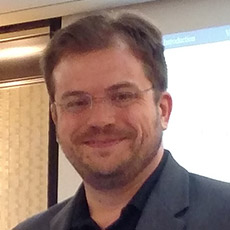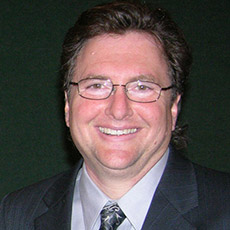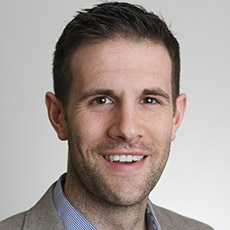Developmental Area Welcomes Three New Faculty
Pascal Deboeck, Ph.D.
 |
|
Pascal Deboeck, |
Current Position and Past Achievements:
I am thrilled to be joining the University of Utah through the C-FAHR cluster hire following 8 years at the University of Kansas where I was an assistant and associate professor for the Quantitative Psychology program.
Current Research:
I was trained in Quantitative Psychology at the University of Notre Dame. I specialize in the development and application of methods for the analysis of repeated, within–person, observations. While the prevalence of data such as ecological momentary assessments, diary data, and physiological measures has increased, the analysis of these data is often challenging, as frequent, nonlinear, back–and-forth fluctuations are common. My research integrates statistics, dynamical systems theory, methods for analyzing repeated observations, and rich theories about intraindividual change and variability.
This research offers the potential for addressing novel questions about how, when and why individuals vary in series of repeated psychological, behavioral and medical observations.
Bruce Ellis, Ph.D.
 |
|
Bruce J. Ellis, |
Current Position and Past Achievements:
As an iconoclast in my youth, and someone who was always attracted to big ideas, I developed a passionate interest in evolutionary psychology—the idea that Darwin’s great theory could help explain human psychology and behavior. I knew that I was on to something when I gave my very first classroom presentation on this topic (in an undergraduate Sociology of Sex Roles class at Cal Poly); it caused such a stir that the professor went in for 3 hours of Gestalt Therapy afterwards. Now I always tell my students that if they can so fundamentally challenge their professors’ ideas that it sends them into therapy, then they are doing their jobs as creative thinkers and learners.
Inspired by the Sex Roles class, my first research project involved a comparison of male and female sexual fantasies. The resulting article achieved a dubious distinction: It became the most cited scientific paper ever written on sexual fantasy. That meant that I spent the first decade of my career known as “the sex fantasy guy.” It wasn’t until I published the theory of biological sensitivity to context that I was able to shed that moniker and become known instead as “the orchid-child guy.” That corresponded to my own transition to parenthood and becoming a developmental psychologist.
I was originally trained as a canonical evolutionary psychologist in David Buss’ laboratory at the University of Michigan, where I studied adult sexual and romantic relationships. Developmental processes were largely taken for granted in this context. I became dissatisfied with this approach, undertook three years of postdoctoral training in developmental psychopathology at Vanderbilt University, and shifted from studying adult behavior to developmental processes and mechanisms. My first job was at the University of Canterbury in New Zealand, a country that boasts 7 sheep for every 1 human being. In time I was attracted back to the United States by the excellent research opportunities and the better human-to-sheep ratio. I spent 12 years at the University of Arizona before starting my current job at Utah.
Current Research:
My theoretical writings and empirical work seek to integrate evolutionary and developmental perspectives on the role of family environments in regulating child stress reactivity, pubertal development, risky adolescent behavior and cognition, and related health outcomes. I am particularly interested in mapping key dimensions of the environment that children’s brains detect and respond to, how these dimensions become embedded in the physiological parameters—set points and reactivity patterns—of stress response systems, and the role of different stress response profiles in mediating and moderating the development of life history strategies (e.g., timing of sexual maturation, intrasexual competitive behaviors and risk-taking, patterns of mating and parenting). In addition to this basic research, I am interested in real-world applications in the form of theoretically-based interventions.
What do you like most about your work:
What I like most about my work is the ongoing process of learning and discovery that characterizes my life as a teacher and scientist. I love the chance to pursue ideas, tackle big problems, and build the bridges and collaborations to make that happen.
Selected Publications:
Ellis, B.J., Oldehinkel, A.J., & Nederhof, E. (in press). The Adaptive Calibration Model of stress responsivity: An empirical test in the TRAILS study.Development and Psychopathology.
Del Giudice, M., & Ellis, B.J. (2016). Evolutionary foundations of developmental psychopathology. In D. Cicchetti (Ed.), Developmental psychopathology, Vol. 2: Developmental Neuroscience (3rd Ed.) (pp. 1-58). New York: Wiley & Sons.
Ellis, B.J., Volk, A., Gonzalez, J.M., & Embry, D.D. (2015). The Meaningful Roles intervention: An evolutionary approach to reducing bullying and increasing prosocial behavior.Journal of Research on Adolescence. DOI: 10.1111/jora.12243
Ellis, B.J., & Del Giudice, M. (2014). Beyond allostatic load: Rethinking the role of stress in regulating human development.Development and Psychopathology, 26, 1–20.
Bjorklund, D.F., & Ellis, B.J. (2014). Children, childhood, and development in evolutionary perspective.Developmental Review, 34, 225–264.
Lee Raby, Ph.D.
 |
|
K. Lee Raby, |
Current Position and Past Achievements:
I completed my B.S. in psychology from Truman State University, a liberal arts university in Missouri. During my undergraduate years, I was involved with two research labs. One focused on understanding parent-child interactions during early development. The other investigated connections between physiological systems and individuals’ thoughts, emotions, and behaviors. I was able to combine these interests and experiences as a doctoral student at the Institute of Child Development at the University of Minnesota. Specifically, I worked on a 30-year longitudinal study and used data from that study to examine the long-term significance of early caregiving experiences for individuals’ behavioral and biological functioning during adulthood. For my dissertation, I examined the caregiving-related antecedents of adults’ autonomic nervous system responses while they were having a discussion with their romantic partners about a conflict in their relationship. My doctoral research was funded by a pre-doctoral fellowship from the National Institute of Mental Health as well as a dissertation fellowship from the University of Minnesota.
After receiving my Ph.D. in Child Psychology, I completed post-doctoral training with Dr. Mary Dozier in the Department of Psychological and Brain Sciences at the University of Delaware. That position allowed me to develop expertise collecting and analyzing biological data related to children’s neuroendocrine responses to stress. During that time, I also had the opportunity to work with various types of children at risk for problematic developmental outcomes, including children who had been adopted internationally.
Current Research:
As an Assistant Professor in the Department of Psychology, I will be continuing this program of research by investigating the significance of parent-child relationship experiences for the biological and behavioral development of adopted children. Because these children are genetically unrelated to their adoptive parents, research with these families has the potential to provide basic insights into how development is shaped by interactions between children’s genetically based characteristics and their environments. At the same time, this work will provide valuable information about the caregiving-related experiences that can promote the healthy development of this unique group of children.
What do you like most about your work:
I find my work to be immensely rewarding in a number of ways. My research activities provide opportunities to grapple with fundamental and time-honored questions about the nature of human development. My hope is that my work helps advance our understanding of these issues while also providing information that is practical and useful in supporting the healthy development of children and families. I also find it fulfilling to work with students, either in the classroom or in the lab, and to help inspire them to think more critically and clearly about complex issues related to human development. It is a privilege to be a member of a renowned university that is dedicated to the education and well being of the whole community as well as a member of a distinguished department that is supportive of collaborative, interdisciplinary research. It is an exciting place to work!
Selected Publications:
Raby, K. L., Labella, M. H., Martin, J., Carlson, E. A., & Roisman, G. I. (in press). Childhood abuse and neglect and insecure attachment states of mind in adulthood: Prospective, longitudinal evidence from a high-risk sample.Development and Psychopathology.
Raby, K. L., Roisman, G. I., & Booth-LaForce, C. (2015). Genetic moderation of stability in attachment security from early childhood to age 18 years: A replication study.Developmental Psychology, 51, 1645-1649. DOI: 10.1037/dev0000053
Raby, K. L., Roisman, G. I, Fraley, R. C., & Simpson, J. A. (2015). The enduring predictive significance of early maternal sensitivity: Social and academic competence through age 32 years.Child Development, 86, 695-708. DOI: 10.1111/cdev.12325
Raby, K. L., Steele, R. D., Carlson, E. A., & Sroufe, L. A. (2015). Continuities and changes in infant attachment patterns across two generations.Attachment and Human Development, 17, 414-428. DOI: 10.1080/14616734.2015.1067824
Raby, K. L., Roisman, G. I, Simpson, J. A., Collins, W. A., & Steele, R. D. (2015).Maternal insensitivity in childhood predicts greater electrodermal reactivity during conflict discussions with adult romantic partners.Psychological Science, 26, 348-353. DOI: 10.1177/0956797614563340
Raby, K. L., Lawler, J. M., Shlafer, R. J., Hesemeyer, P. S., Collins, W. A., & Sroufe, L. A. (2015). The interpersonal antecedents of supportive parenting: A prospective, longitudinal study from infancy to adulthood.Developmental Psychology, 51, 115-123. DOI: http://dx.doi.org/10.1037/a0038336
Raby, K. L., Cicchetti, D., Egeland, B., & Collins, W. A. (2013). Genetic contributions to continuity and change in attachment security: A prospective, longitudinal investigation from infancy to young adulthood.Journal of Child Psychiatry and Psychology, 54, 1223-1230. DOI:10.1111/jcpp.12093
Raby, K. L., Cicchetti, D., Carlson, E. A., Cutuli, J. J., Englund, M. M., & Egeland, B. (2012). Genetic and caregiving-based contributions to infant attachment: Unique associations with distress reactivity and attachment security.Psychological Science, 23, 1016-1023. DOI:10.1177/0956797612438265
